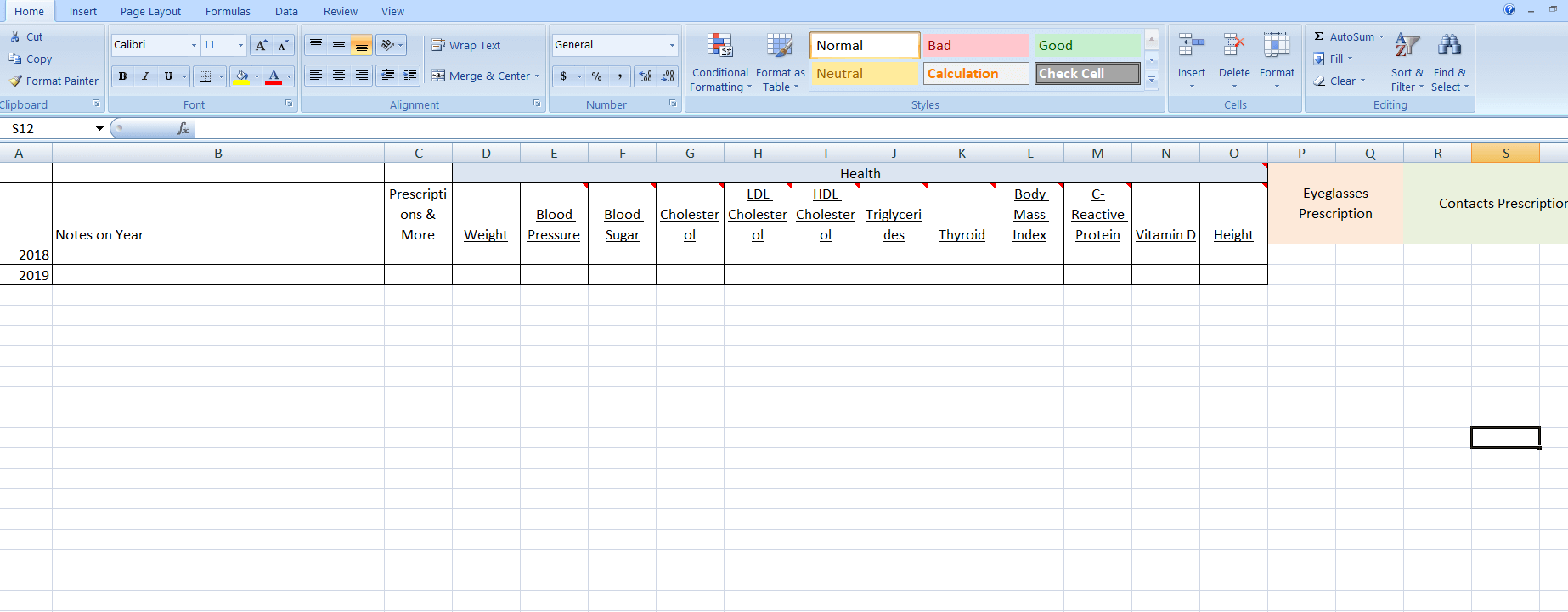How Much Do You Keep Track of Your Health Stats? (Plus, Kat’s Weird Health Chart!)
This post may contain affiliate links and Corporette® may earn commissions for purchases made through links in this post. As an Amazon Associate, I earn from qualifying purchases.

My brother emailed me recently to tell me about a high triglyceride reading (because, he explained, “we share genetics and all,”) and I quickly reviewed all of my triglyceride levels since 2000, based on a chart I started keeping several years ago, as I mentioned in my post on how much I'm kind of obsessed with lists.
Then I realized I'd never really shared my health chart and thought, hey, maybe the readers would like to have their own health chart… or maybe they have a better way of tracking health stats — so let's discuss.
Here are the Qs: How much do you keep track of health stats, like all those numbers you get from doctor's visits (cholesterol, triglycerides, blood pressure, etc)? What level of trust do you have in your doctors to tell you when things are wrong? If you've got a big role in someone's medical care where they have Issues (whether it be yourself, an aging parent or a kiddo) how do you keep track of everything?
I should note that my trust in the medical establishment is severely eroded after I had a pretty horrible patient/customer experience with my first son's birth — we both came out of it ok but a) I didn't see my carefully-vetted OB/GYN for the entire time I was in the hospital (despite the fact that her office was across the street and she was even in the hospital for rounds during at least one of the days), b) not being “attached” to a doctor meant that we kind of got totally forgotten about at the hospital, which stunk for reasons I went into more when telling J's birth story.
(I'm really grateful that medically we were both OK, but the whole experience left me really angry with my former doctor, who I haven't spoken to since the phone call where she told me to head to the hospital.) But my jaded lesson after all that is that I want to be able to assess my own medical issues without expecting/hoping a doctor to go above and beyond and catch something that isn't obvious. (Ditto for my kids and our aging parents when the time comes for my husband, brother or myself to be more involved in their care.)
It isn't that I don't trust that they're competent professionals — but I tend to believe that they're not your buddy, they're not “looking out for you” and if you don't ask them about something or push to be taken seriously the issue might not be found.
(Of course there's a ton of additional reading to be done out there about how doctors don't listen to women and downplay their health concerns — see these articles in The New York Times and The Atlantic to get you started.)
(Just to be tooootally clear here, I am not suggesting that this health chart is any kind of substitute for medical care — I'm just saying I use this chart to track the data I get from the doctor and raise questions if I see disturbing trends over time.)

Anyway: this is my weird little Excel health chart (you can click the screencapture above to see the chart bigger, or download the Excel doc here if you'd like it for yourself; obviously I've removed my own medical data). The rows are the years, the columns are the various stats I'm tracking; there are comments in each column header for what the stats “should be,” again based on that Real Simple article. I basically add one line each year and put whatever numbers I get into that row on the chart.
The columns are health stats I'm tracking based on an old Real Simple article — I don't get all of the numbers every year but it is interesting to see how things have changed as I've gotten older. I tend to be pretty healthy so personally I just jot a few things down in the Notes column, like if I took any prescription drugs for a limited time (like antiobiotics after strep), if I had any major issues (like tearing my ACL/reconstructing it a few years ago) or if I see something as “the beginning of an issue” (like seeing an orthopedic surgeon last year for what I worried was carpal tunnel and finding out NOPE, it's just arthritis in my thumb, and getting my first cortisone shot… yay…).
How about you guys — do you keep track of any of your own health data like blood pressure, triglycerides, etc? (Anyone have any fun apps?) What other little things do you do to educate and empower yourself as a patient?
Further Reading:
- Numbers to Live By [Real Simple]
- 13 Health Stats Every 20-Something Should Know [Greatist]
- How to Track Everything In Your Life Without Going Crazy [Lifehacker]
- 9 Health Statistics That Actually Matter – And When You Should Check Them [Men's Journal]

There’s also a really good AirTable template for health history that I’ve been planning to try out.
I’ve found that my hospital system’s electronic medical records software… leaves a lot to be desired. If I can present my history of lab results to my doctor, that saves us a ton of appointment time vs. viewing digitized LabCorp results documents one-by-one (a real example that happened recently since it isn’t a commonly tracked data point to the general population, though it’s common for people with my medical condition).
Just commenting to say that I will definitely start tracking these things now. It never before occurred to me that it might be super helpful to have a benchmark for what my “normal” is at any given age.
Dad keeps all of my medical records, but you can track alot of things directly on your smartphone with the FITBIT app, which gives your Dad remote access. He can see when I exercise, how many steps, my heartrate, and how many calories I am burning at all times. You must be carful to take your watch off if you don’t want your dad finding out you are NOT walking, and if are set for GPS and you are busy inside doing the Horizontal Hora, he can see that too, b/c you are not walking, but your heartrate and pulse are goeing up even though you are in the same place! FOOEY!
As a family physician, I follow the United States Preventive Services Task Force recommendations for screening (https://epss.ahrq.gov/ePSS/search.jsp). Not everyone needs to have their sugar and cholesterol checked every year. Screening for thyroid, C reactive protein, and vitamin D also aren’t needed routinely for people without certain medical conditions or symptoms. Check out this expose of the main scientific researcher behind vitamin D: https://www.nytimes.com/2018/08/18/business/vitamin-d-michael-holick.html.
Since this thread isn’t too old, I’d like to add that I just learned from patient advocate Jen Brea of a fairly spendy service called “Picnic” that collates medical records and converts them into easily reviewed formats. It may be worth the investment for someone with a complicated health history.
With so many medical records and health records systems in use, and given that often they do not communicate well together, it is totally reasonable and useful to keep track of this type of information on your own. I use a similar Excel sheet to track labs and health events, and it helps me feel confident that I’m on top of things like derm skin checks or preventive screenings as I’m terrible with remembering when, or plan for services if I am not in fact on top of it. An added bonus is it helped me argue out of an unnecessary bill: a lab reported a value that was wildly inconsistent with my history and when I asked them to rerun it, they said there would be a fee, but when I shared a few years worth of test values, they agreed to reprocess the sample at no charge. No way was the staff at my doctor’s office going to argue that!
It definitely saddened me a bit to see you play down the work and time you have spent to maintain your health information. You should be proud of yourself for finding a way to keep track of super complicated information in a way that works for you.